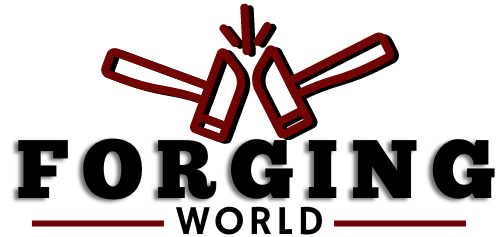Since blacksmithing is all about heated steel, having something to achieve those high temperatures is a must. People who are just getting started in blacksmithing would be surprised how much equipment they actually need. Many people are still not sure whether a propane torch is suitable for forging.
Can You Forge with a Propane Torch?
A propane torch can be used for forging, especially in the beginning phase. Moreover, propane torch usually achieves forging temperatures without a problem. It is also commonly used for welding purposes. Propane is extremely popular among blacksmiths due to its low price and ease of storage. It is also easily attainable.
Next, you will learn more about the usage and benefits of propane torches in greater detail. Remember, the most important thing is to stay safe, so we will also talk about the necessary safety precautions when working with propane.
What Temperature Can a Propane Torch Achieve?
A propane-oxygen torch can achieve 3,623°F ( 1,995°C) when used in the open air. That is typically enough for blacksmithing purposes. It is commonly used for localized heat or small blacksmithing projects. Propane is a natural hydrocarbon and component of natural gas. Since it is colorless and odorless, it can be tough to smell for leaks. On the other hand, a propane-butane torch goes up to 2237 °F (1225°C).
The flame consists of two cones, an inner dark blue flame, and an outer light blue flame. Except for pure propane, there is also a propane mixture called MAPP® gas. That is a mixture of propane and methylacetylene-propadiene. The advantage of MAPP is that it burns hotter than pure propane. To be more precise, it burns at 3,720 °F (2,050 °C). If you combine MAPP gas with oxygen, you can achieve temperatures that are hot enough to melt steel or iron.
One of the best choices on the market is Blue Flame 9XTL. I have been using it for a few months and I could not be more satisfied with it.
Propane vs. Acetylene- Which is Better for Forging?
As the cost of acetylene continually goes up, its usage among blacksmiths and bladesmiths is dropping down. One of the biggest pros of acetylene is that it burns hotter than propane. Unfortunately, acetylene has become harder to find, which drives the cost higher.
Acetylene can also pre-heat the material faster, but that doesn’t mean propane can. In fact, with enough experience and the correct setup, propane can actually exceed acetylene. In the end, the most determining factor is the type of work you are doing. For welding, acetylene is usually the superior choice, but for forging purposes, propane is quite sufficient.
Propane also appears to be safer than acetylene. Namely, acetylene typically ignites at air mixtures from 2.5 to 80%, while propane ignites somewhere between 2.1 to 9.5%. As you can see, propane is actually a much safer option, but remember, they are both still flammable gases. That is why safety precautions and equipment are necessary for both options.
Propane is one of the most popular choices of fuel in blacksmithing. It is the cheapest and also easily available. That is why many people are making the switch from acetylene to propane. The tank and the tips are the only things you need to replace to switch from acetylene to propane.
How to Light a Propane Torch?
- First and foremost, check the tank for leaks. Never ignite the propane torch if you smell any gas. That could easily lead to fire or explosion.
- Now, open the tank’s valve. Note that different tanks open differently, depending on the manufacturer. Usually, there is a knob that opens it. You should also hear gas slipping away.
- Ignite the flame with the sparker.
- Set the desired intensity of the heat using the adjusting valve.
- When you are done, shut off the tank’s valve.
Safety Precautions When Using Propane Torch
- Wear safety glasses
- Keep the propane tank upright and secure
- Make sure that the torch is not pointed at anyone
- Do not use a torch near combustible materials
- Do not use the lighter to ignite the flame
- Check for leaks
- Do not smoke or light in open flame near the tank
- Never leave the propane tank in the vehicle
- Work only in well-ventilated areas
- Always have a fire extinguisher and a bucket of water near the work area
- Have a carbon monoxide detector in the workshop
I use a torch almost every day in the workshop, especially when I need localized heat. While I could do that with my coal forge, using a torch is a much easier and faster option. You simply light it and heat the desired portion of the material. This is especially handy when you just need to bend a small part of the metal.
Another benefit of using the torch is when you are making some weird-shaped objects. If you don’t have a coal forge or large gas forge, forging weirdly shaped is extremely hard. Placing an item like that in the small gas forge is almost impossible, so that’s where the propane torch comes in.
Nowadays, most beginners use gas forge instead of coal forge. That is mainly due to its simplicity and availability of fuel. Also, learning to heat the metal with the torch is so much easier than using the coal forge.
Also, remember that propane is much more available than coal. Finding good-quality coal for blacksmithing is becoming more and more challenging, which makes propane more appealing.
Should You Refill or Exchange a Propane Tank?
Refilling a Propane Tank
If you are the type of person who likes to rely on your own procedures rather than somebody else, refilling the gas tank might be a better option for you. Not only that, but it is also a lot cheaper than replacing it with a completely new one. Another great advantage of refilling a propane tank is the fact that you often get more propane.
Namely, in many exchange vendors, it is actually a policy not to fill the tank completely. Just keep in mind that the tank should not be older than 5 years because most refill stations may refuse to refill it, so recertify your gas tank to extend its usage.
Exchanging a Propane Tank
Contrarily, exchanging a propane tank is a much faster and more convenient option for most people. It is also much easier to find the exchange than the refill station. This option guarantees you that the tank is safe and cleaned with printed guidance and safety information. Before making an exchange, pay attention to the tanks’ weight because tanks often vary in their empty tare weight.
Knowing that always search for ones with the lowest tare weight. Also, make sure that your new tank is not expired or corroded. We recommend getting a 100lb tank (24 gallons of propane) as with larger tanks you get more discount.
If you are planning to use propane forge, we would recommend you get at least a 100lb tank, which is 24 gallons of propane. With bigger tanks, you get more discounts.
Maintaining the Propane Tank
Ambient temperature is one more important determinant of propane. Just because propane is within the tank, it doesn’t mean it is unprotected. The optimal environmental temperature for propane is 60 degrees Fahrenheit (15°C).
With higher temperatures, the tank gauge reading goes up. The propane weight is still the same, but its molecules have just become more spread out. The opposite happens when temperatures are lower.
The volume of propane has decreased because of its greater density at lower temperatures. When working with a gas forge, make sure to keep tank pressure up as the tank can stop working properly.
In order to maintain an ideal temperature, one of the best and most effective ways is to use a propane tank heater like Dura Heat TT-360 Propane(LP) 360 Degree Tank Top Heater. It easily transfers heat to the tank, which in turn raises the BTU of the propane. It will also save you a lot of time from frequent tank refills. Although not necessary in the summertime, during winter it is definitely worth using.
To properly gauge the economy between coal and gas, you should consider a lot more than just fuel cost. For example, with a gas forge, you can start working the moment you light off the forge, whereas, with a coal forge, you spend a lot of time tending the fire.
The cost of time is more precious than money. Also, with a gas forge, you can make a lot more pieces per hour, which makes your production work significantly effective compared to a coal forge.


